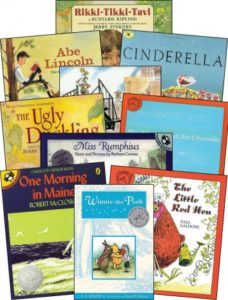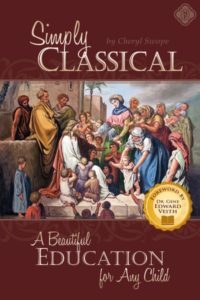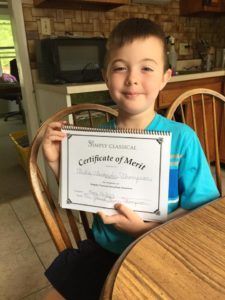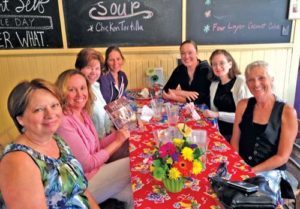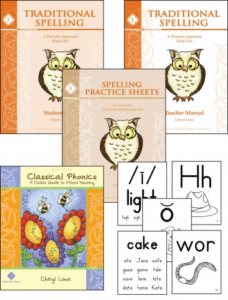Cheryl Swope's Blog, page 9
June 1, 2018
Summer Planning? Free shipping on Memoria Press orders in June
June is a great month to order online from the comfort of your own sofa!
Order Simply Classical, Myself & Others, or any Memoria Press item. In this rare summer offer, enjoy free shipping with this code: SHIP18FREE6.
If you like to hold, touch, and see first, visit any of the Memoria Press events this summer. If you already love MP, if you’re interested in changing to Simply Classical or Memoria Press, or if you just want to be refreshed and educated, come to Sodalitas or CLSA Teacher Training.
Attend our unique classical special-needs sessions at Sodalitas July 9-10. The past few years our special-needs attendance quadrupled to standing-room-only last year. (Tip: Everything also comes with free shipping if you order from Sodalitas!) By “special needs” we mean everything from ADHD, dyslexia, dysgraphia, autism spectrum, Down syndrome, anxiety/mental illness/OCD/bipolar, to not-yet-diagnosed-but-suspecting learning challenges. The larger Sodalitas & CLSA conferences include impressive sessions for all students — gifted, average, or somewhere in between.
This year our special-needs sessions may be placed in our own beautiful setting to provide sufficient room. Recently I toured the spacious building where I hope we will be. Lovely!
In the meantime, if you need anything for your summer or upcoming school year in the classroom or home, June is suddenly a great time to order!
May 24, 2018
“Delightful!” — Meet Simply Classical, Early Childhood Special Education Curriculum
Looking for an effective, easy-to-teach early childhood special-needs program for autism, intellectual disability, ADHD, motor or language delays? Simply Classical Levels A, B, and C are designed for boys and girls with all of these special needs and more. With free readiness assessments in fine-motor, speech and language, cognition, and social-emotional areas, you can know exactly where to begin. (For older children, see Simply Classical Levels 1, 2, 3, 4 and beyond. Look for 5 & 6 later in 2018).
Teach your child yourself, as homeschoolers are doing with gratifying successs, or recommend Levels A, B, and C for your early-childhood special education classroom. We offer 34-week lessons in both charter and Christian versions. One parent wrote, “Run – don’t walk – to the Simply Classical Curriculum! There is nothing else like it.”
Kate, a Simply Classical student, is a little girl with Down syndrome. Kate’s mother wrote this:
“…The final, and the most beautiful, piece to the puzzle for Kate’s early preschool education is the new Simply Classical curriculum from Memoria Press. Hearkening back to the quote from Martin Cothran*, and based on her book, Cheryl Swope is designing classical curriculum for special needs children. We have begun working through the first level with Kate this summer.
We start each day with a prayer from the beautiful Little Golden Book Prayers for Children. When we talk about the baby birds and mama bird on the page, Kate practices her speech and her signing. From there, each day includes basic calendar activities (days of the week and weather), counting and alphabet recitation, as well as beginning memory work from Scripture. We then read the book of the week.
Cheryl Swope has chosen wonderful books from authors including Beatrix Potter, Richard Scarry, Eric Carle, and Margaret Wise Brown, among others. Because these are board books, they are perfect for little hands and allow Kate to practice her fine motor skills by turning the pages for me.
Fine and gross motor, oral language, and other therapies are wrapped into the weekly readings. We practice making a pointing finger to count objects; we jump, squat down, and push strollers to act out parts of a story; we discuss feelings and learn empathy while learning to read emotions on the faces of the characters.
Cheryl Swope has taken those skills that need explicit instruction and woven them beautifully into activities springing out of the books we are reading. She has captured special needs preschool and bottled it inside something true, good, and beautiful.”
*If a child cannot accommodate the amount or depth of knowledge of most children, it is not less, but more important that what he learns be of the highest quality. Martin Cothran
Read more testimonials and watch our video. Visit ClassicalSpecialNeeds.com to learn more. For ordering information beyond what you see on the links above, contact sales@memoriapress.com.
May 21, 2018
How To Teach Social Skills & Manners through Children’s Literature
Ready to see improved social skills and manners within 14 weeks? Myself & Others: Lessons in Social Understanding, Habits, and Manners is a new program for anyone who wishes to restore common decency in our culture – one student at a time. We help children see the need of others, become more compassionate, and more interested in serving, developing healthy habits, and practicing good manners.
This program is designed for any child but can also be taught to children with special learning needs, such as those with autism, attention or executive function difficulties, mental illness, medical or neurological conditions, learning or language disabilities, or intellectual disability, such as Down syndrome. We include the visual aids and clear instructions to assist teaching.
Myself & Others provides explicit, bite-sized lessons expanded through the delight of classic children’s literature. Whereas some social skills programs can be overly clinical, uninspiring, and oddly self-focused, Myself & Others helps your child see beyond himself in meaningful, memorable ways. Children’s literature is the “special ingredient.”
Each 14-week program is designed with 4-day weekly lessons for ages 4-13. Younger children can be taught in as little as 30-40 minutes per day.
Each set is a stand-alone course that can be taught alongside any curriculum in the home or classroom during the school year and also serves as a perfect summer course.
For parents, homeschoolers, grandparents, tutors, and summer day programs —
Order now: Myself & Others for summer or fall.
Questions: sales@memoriapress.com
Grateful for the excellent books we get to dive in to with Memoria Press! We use the Myself and Others Level 1 set and just finished the book Rikki Tikki Tavi this week.
[A]ll 3 of my boys loved it and my oldest has been asking for a mongoose since the first day we read it.
Today, our little chihuahua mix killed a garden snake in the backyard while the boys were playing and now they can’t stop talking about how loving and loyal our dog was to “save their lives” (although they weren’t in any real danger, lol!).
I love that both my autistic 5 year old and his neurotypical brothers all learn so much from each week and their love of good books continues to grow!
Thank you for putting these sets together! They are wonderful for everyone! — Jeannette
May 18, 2018
Simply Classical – Where the Book Is Always Available for You
Our copies of Simply Classical recently SOLD OUT on Amazon but the book is always available here at a consistently low price.
We received this yesterday:
“I finished Cheryl’s book, Simply Classical, and could not be more pleased or excited about the upcoming year. This makes so much more sense with what I believe scripture says about children, and their need for direction. I have a degree in social science education, and I did not realize how much I’d bought into some newer thinking about children and education.
I have now ordered the entire day for my kids. Behavior is better, and they are both learning so much. I’m slowly ordering my own mind again, and can see how ordering the minds of my children is going to benefit them as well.
Thank you Cheryl, for writing Simply Classical. It’s been a game-changer already and we haven’t even officially started schooling. I’m so excited to see what my boys are capable of, and what other surprises are in store for us. Thank you!!!” — P
The Best Way to Teach Writing for Special Needs
This new student completed lessons in grammar, composition, and reading comprehension the best way possible: through delightful stories!
Blossoming readers need more than practice. They need to discover the riches of a good story.
With simplified exercises in word study, composition, and oration, these delightful guides provide a joyful introduction to children’s literature.
Teach essential language arts skills and build a good vocabulary, as your students encounter stories of tenderness, bravery, and kindness.
Created especially for struggling learners or students with special needs, these adaptations of the Memoria Press originals are each subtitled “A Guide to Reading Deeply and Writing Skillfully through a Collection of Four Stories.”
Our Simply Classical StoryTime Treasures program gives children enjoyable exercises to delve deeply into stories they already know and love. View samples and see the storybooks here.
Thanks to his momma Jessica, one of our FB Memoria Press Simply Classical Families members.
See more Simply Classical FB news by following and sign up for our free magazine!
May 7, 2018
Simply Classical: A Beautiful Education for Any Child — 5-Year Anniversary!
Five years ago this month, Simply Classical: A Beautiful Education for Any Child (Memoria Press, 2013) was published. In the book we told our twins’ story to let people know that a classical education can benefit any child who can learn! We provided charts, schedules, book lists, tips, stories, and plenty of encouragement. I hoped only that the book would help someone.
In five years, the book has sparked a full line of teaching materials for children with special needs. Now homeschooling families, tutors, classrooms, and schools can teach from the Simply Classical Curriculum. Our free Simply Classical online forum provides a community where families support one another. We have a closed FB page (Memoria Press Simply Classical Families) and my public FB page, Cheryl Swope Author where people can connect.
Most recently, we launched a free magazine, the Simply Classical Journal. We invite all to subscribe for heartwarming, thought-provoking articles and the news about latest teaching resources. Currently the magazine comes to your door twice a year.
Our latest teaching resource, Myself & Others, a social skills program, assists anyone — parent, grandparent, teacher — in teaching manners and social awareness through children’s literature. Designed for ages 4-13, each level is taught over 14 weeks. (Perfect for summer.)
I am thankful for my local friends, the beautiful ladies in the photo who surprised me with a celebration of my first book, Simply Classical, five years ago.
Today I am also thankful to our thousands of readers — teachers, special educators, schools, classical educators, parents, school administrators, university programs — and especially to our families of children with special needs who have responded so warmly to the book and to the Simply Classical Curriculum.
We now announce with great joy that our work on an updated, revised, expanded second edition of Simply Classical: A Beautiful Education for Any Child has begun. We will announce when it becomes available.
Thank you all!
April 22, 2018
Give Children with Autism What They Really Need: April is World Autism Awareness Month
Give Children with Autism What They Really Need
Cheryl Swope
Apr 20, 2018
April is World Autism Awareness Month, but I wonder if anyone in North America is truly unaware of autism. With a reported 119.8% increase in identification and 1 in 68 children in the United States currently diagnosed with autism, most of us in North America are aware. With a master’s degree in special education and K-12 lifetime teaching certifications in learning disabilities and behavior disorders, I sometimes wonder if we over-identify autism in the United States, but I never doubt that autism exists.
Autism as defined by the Diagnostic and Statistical Manual-5 (fifth edition), and summarized here, is a neurodevelopmental condition characterized by four criteria:
1) persistent difficulties in social communication and social interaction
2) restricted, repetitive patterns of behavior, interest, or activities including stereotyped movements, insistence on sameness, and restricted, fixated interests; hyper- or hypo-sensitivity to sensory input
3) These symptoms must be present early in life.
4) These symptoms must cause significant impairment.
Awareness is indeed important. Know the early warning symptoms. Know the inherent safety risks with autism. Obtain an evaluation for autism from a children’s hospital or developmental-behavioral pediatrician, so speech and language therapy, occupational and physical therapy, sensory adaptations, and effective behavior strategies can begin immediately. Early intervention can be powerful.
However, my concern as a classical Christian educator is not only with awareness, but what we do next with the children who are diagnosed.
Inclusion
I cringe when I read the word that often bubbles up whenever we attempt to categorize people: inclusion. Inclusion itself seems laudable: embracing and integrating. But we must define our terms. Inclusion of children with autism often entails enrollment into programs focused solely on “behaviors,” “life skills,” and “hands-on work,” and this can become little more than a dehumanizing, pediatric technical school.
When I see Autism Awareness placards clamoring for “inclusion” I cringe because I know that children with autism often gain access only to our failed educational experiments.
In 1975, Public Law mandated free public education for all children, including those with special needs. This seemed noble, but by the mid 1970s public education had already begun stripping itself of whatever Truth, Goodness, and Beauty remained. Right and wrong could no longer be “imposed” upon children, and devotion to the great tradition had largely disappeared as Great Books were exchanged for more popular or practical reading. Content began to be replaced with innovative methods. Recitations, memory work, Socratic teaching, fables, and even teacher-led teaching were deemed antiquated. Great art, music, historical heroes, Latin, Greek, and the great ideas in mathematics and science were replaced with more utilitarian or trendy pursuits. Cast aside in both academia and in teacher training, such staples in education became abandoned for newer and, presumably, better approaches.
Thus today, when I see Autism Awareness placards clamoring for “inclusion” I cringe because I know that children with autism often gain access only to our failed educational experiments. Like a trampled welcome mat tossed by the back door and leading only to a cluttered, disheveled garage, this weary invitation of inclusion leaves me cold.
What Can We Do?
I learned plenty from my master’s degree coursework and from clinical experience in special education, but I learned about the promise of effective education most pointedly from twin fair-headed babies who came to us at the same moment through adoption. Both of these children have autism, as I described in my book, Simply Classical: A Beautiful Education for Any Child:
“Michelle wriggled and squirmed. She craved deep contact but could not sit still long enough to enjoy being held. Her sensory system seemed to malfunction. Seemingly impervious to pain, Michelle combat-crawled into furniture and walls, banging into them as if on purpose. Nothing most toddlers would deem painful seemed to bother her, but then when we tried to remove a shirt over her head, she cried as if in agony. Language, too, appeared to be an area of difficulty….”
Her twin brother Michael had low muscle tone, difficulties speaking clearly, and a tendency to wander. He suffered from mood swings and melancholy, tantrums and rages, and he struggled to pay attention even in our homeschool tutorial setting.
Over time Michael and Michelle revealed several specific learning disabilities; low functioning memory; and, like their biological mother, severe and persistent mental illness–specifically schizophrenia, an illness that results in terrifying hallucinations, paranoid delusions, and disordered or blocked thinking. Both children, now 23, were given a classical Christian home education.
They studied Latin for years. They studied history, geography, art, music, mathematics, natural science, logic, rhetoric, and theology. We adapted to their levels but did not compromise on content. When they needed additional review, we provided simple games and multi-sensory exercises. When they could not read, we read to them. When they could not write, we broke down the task of writing into its smallest parts. (Simply Classical Writing: Step-by-Step Sentencesand all of the Simply Classical Curriculumis based on this approach.)
We discovered that the steady routine and sequential learning inherent in a classical education serves the autistic mind’s need for predictability. The broad scope of a liberal arts education counters the narrow interests so common in autism. Compassion, empathy, and mercy evoked by good literature assists in the otherwise difficult challenge of considering how others think or feel. Poetry opens cognitive and linguistic doors. Enriched vocabularies bridges social gaps. Arithmetic, mathematical reasoning, music theory, geometry, and astronomy brings a sense of wonder and the stabilizing comfort of divine order.
On the way to and from therapies and doctor appointments we listened to poetry set to music, chanted Latin declensions, or heartily sang the songs that “every child should know.” At home, on trips, and when they needed to rest, we read to them Shakespeare, Dickens, and Tolkien. We had some unspeakably hard years, but we pressed on.
In compliance with state mandates, our children were tested by the children’s hospital when entering 8th grade. In some measures both children tested as post-secondary students would test. We knew this was not due to their innate abilities because earlier testing had revealed much lower scores. I knew it was not because of my own abilities, because I had taught in private special schools with rather miserable outcomes when I taught from romanticized and so-called progressive pedagogical approaches. And I had served as the inclusion coordinator among twelve elementary schools in a public school district, but we never saw such measurable results.
Is an effective education measured solely in test scores? Of course not. Yet, having taught two upper level psychometrics courses, the measurable result we saw in Michael and Michelle grabbed my attention. I knew with certainty that my children’s lives had been changed not by me, but by classical Christian education.
One Thing Needful
More important than test scores, I began to witness in my children a desire to love and serve others. Both children still reveal autism’s many symptoms. However, like all children who receive an education in the true, the good, and the beautiful, Michael and Michelle have been encouraged to live lives of service to others. Their lives are not dominated by the services done for them, as is so often the case in children and adults with learning disabilities.
In our home a classical Christian education included biblical studies, Scripture memory, singing of hymns, praying, confessing the ancient creeds, and receiving the Word and Sacraments in corporate Divine Service. Thanks be to God, the Lord has become my children’s strength and song, and He has become their salvation.
Today, my desire is for all of our children with special needs to be embraced by our classical Christian schools and home schools, whether in classrooms, small groups, or tutorial settings. We hope that our Simply Classical Curriculum may assist with this vision.
Service
Michael and Michelle will need good medical care, nutrition, and supervision for the remainder of their lives. They will also need to know they are loved, forgiven, and kept in Christ Jesus who lived, died, and rose again for them. In this truth alone they find hope amid sorrow, strength amid tribulation, and courage to love and serve others in their own trials.
Michelle now works a 4-hour shift, two days a week, as Activities Aide in a nursing home. She chats cheerfully with residents who come to the Activity Room, and she calls the Bingo numbers when they want to play. Sometimes she notices yet another elderly person who “sleeps more hours in the day.” Michelle’s voice softens as she enters such a room quietly. With a high, clear tone, she sings a lullaby, ballad, or hymn. She sings one of her favorites, “The King Shall Come When Morning Dawns,” pensively in a minor key. When I listen to her sing these verses, my soul is quieted:
The King shall come when morning dawns
And light triumphant breaks,
When beauty gilds the eastern hills
And life to joy awakes.
The King shall come when morning dawns
And light and beauty brings.
Hail, Christ the Lord! Your people pray:
Come quickly, King of kings!
From childhood Michael wanted to be a pastor, but with his many physical and mental challenges, he knew this would never be. Instead our pastor encourages Michael to serve as his “right-hand man,” a volunteer assistant to our small congregation. On icy mornings Michael spreads salt on the walkways. He greets parishioners as they enter the church. He lights the altar candles. In the evenings at home, Michael listens to audio books or theological podcasts, and he reads in his own library filled with literature and history. He still occasionally hyper-focuses or wears his clothing backward, but he says with greater contentment than I thought possible, “You know, Mom? I like my life just the way it is. I give thanks for everything God has given me.”
Before our recent Easter service, while Michelle prepared to sing in the choir, Michael rang the bell with the pull-rope from the church’s old bell tower and, with instructions well-orchestrated by the pastor, turned on all the glorious overhead lights in the nave at the perfect time to shine suddenly among the candles on the altar during the Exsultet. Sitting with my husband in the pew—and knowing how hard Michael worked to accomplish all of this to the glory of his Savior—I heard the ancient words shouted loudly and boldly as Michael tolled the bell for all to hear:
Exult, let them exult, the hosts of heaven, exult, let angel ministers of God exult, let the trumpet of salvation sound aloud our mighty King’s triumph!
As classical Christian educators we have the resources to replace the worn, trampled door mat that leads only to inclusion in impoverished, barren approaches. Let us spread our best red carpet. Through needed modifications, a classical Christian education can bring children with autism and other special needs an approach of incomparable pedagogical richness. And through Jesus Christ our Savior we can bring these children to their merciful God.
In Psalm 145 we hear, “The LORD is good to all, and his mercy is over all that he has made. All your works shall give thanks to you, O LORD, and all your saints shall bless you!” Now that is inclusion worth celebrating!
originally published by the CiRCE Institute, April 20, 2018
April 3, 2018
In Defense of Spelling: The Meticulous Twin
Spelling is the meticulous twin sister of Reading. Reading may receive all the adulation, but Spelling accomplishes the work. Spelling is where students of Reading come to master their lessons.
The Role of Spelling
Hard-working, durable, and orderly, Spelling holds a respected role in education. Early in the first century, Quintilian wrote:
“As regards syllables, no short cut is possible: they must all be learned, and there is no good in putting off learning the most difficult; this is the general practice, but the sole result is bad spelling. We must beware of placing a blind confidence in a child’s memory. It is better to repeat syllables and impress them on the memory and, when he is reading, not to press him to read continuously or with greater speed, unless indeed the clear and obvious sequence of letters can suggest itself without its being necessary for the child to stop and think.”¹
Spelling teaches the sequences of letters that students can recognize, remember, and reproduce. Spelling enhances Reading, just as Reading enhances Spelling.
Spelling is Orderly
Distracted, self-absorbed, and unbridled, children need order imposed gently upon their minds. If we deny, forget, or romanticize the innately disheveled nature of children, we omit not only the disciplined methods needed to bring order to learning, such as recitations, practice, and predictable lessons, but we also omit disciplined subjects that are needed to bring order to young students’ minds, namely arithmetic, Latin, and spelling.
Consider Spelling’s threefold embodiment of good order:
Phonology: the order and study of speech sounds in phonemes. Linguistic sounds (phonemes) must make sense in the child’s mind. If they do not, spelling errors will reveal this weakness. Examples: “bet” for “bit,” “sike” for “silk.” He may not hear the sounds in the words. We instruct through meticulously explicit phoneme lessons with detailed dictations to emphasize individual sounds and the letters that represent them.
Orthography: the order of written patterns within words. Phonology alone is not enough. If we fail to teach the visual letters and teams of letters (graphemes) that represent sounds (phonemes), the student’s understanding of visual orthography will be weak, and the student may exhibit an over-reliance on aural phonetic cues. Examples: “coyn” for “coin,” “grean” for “green.” He may not see the proper graphemes. We instruct through careful visual lessons in vowel and consonant teams, and irregular forms, and we correct spelling errors so students can see accurate depictions of words.
Morphology: the order and study of units of meaning within words. Spelling teaches roots, prefixes, suffixes, homonyms, and other forms of words with meaning (morphemes). If we fail to teach morphology, the student must memorize all word forms, lest he continually spell all -tion words as “shun.” Latin vocabulary markedly and expertly streamlines the teaching of morphology. Porto (I carry) creates a semantic link to “portable,” “portal,” “portability.” Ex (out of, away from) leads the student to decode and write “export” with confidence. Spelling does the same.
Especially when teaching students prone to spelling difficulties, spelling lessons will be “enhanced when instruction is provided in all three systems.”² Far more than assigning and testing a weekly word list, as many assume, spelling leads to more orderly, observant, meaningful thinking through attention to visible and auditory detail. “Spelling teaches students how to think about spelling, not just how to spell individual words.”³ Spelling helps students “make sense of the writing system of their language.”⁴
What About Spell Checkers?
Pragmatists, ready to abrogate arithmetic to the calculator, will be tempted to abandon spelling in favor of electronic spell checkers. Admittedly, such tools can be useful for an older student to proofread his work; however, students with dyslexia warn us not to think that reactive spell checkers could ever replace the more dutifully attentive, proactive handmaiden Spelling.
Consider this:
[A student] must first be able to produce a spelling close enough to be recognized by the computer program. In addition,
when asked to select the correct spelling, an individual with dyslexia often has trouble distinguishing among words that
are very similar in appearance (e.g., “though,” “thought,” “through,” “thorough”).₅
Spelling will improve a student’s reading, writing, and thinking in layered and lasting ways. Electronic spell checkers, no matter how sophisticated, lack such transformative powers.
Teach Spelling
Mastering phonology, orthography, and morphology will not come naturally to most students. Rather, we must faithfully allot the time to teach. We teach Reading; so we must teach her underappreciated but influential sister Spelling. Reading and Spelling yield linguistic prowess. Let the educative and aesthetic value of a well-read story, a beautifully-crafted sentence, and a perfectly-spelled word spur us on to give Spelling the respect she has earned. As we order sounds, letters, and meanings in our children’s spelling exercises, so these lessons will order the very thoughts in their minds. Over time both Reading and Spelling grow in complexity. Students trained beneath the tutelage of both sisters will grow in confidence and competence, as their own written musings become more pleasing to themselves and to others.
¹ Quintilian, Institutio Oratoria, Book 1., quoted in The Great Tradition: Classic Readings on What It Means to Be an Educated Human Being, 112.
² Mather, Nancy and Wendling, Barbara J. Essentials of Dyslexia Assessment and Intervention, (New Jersey: John Wiley and Sons, Inc., 2012), 166.
³ Mather and Wendling, 167.
⁴ Mather and Wendling, 167.
₅ Mather and Wendling, 167.
We are delighted to include Traditional Spelling Book One in the newly released Simply Classical Curriculum Level 4!
And yes, the answer to our most commonly asked question: MORE LEVELS OF THE FULL-YEAR SIMPLY CLASSICAL CURRICULUM FOR SPECIAL NEEDS ARE COMING in 2018 and beyond! We release at least one per year. We envision 15 levels total.
Currently available: Readiness A, B, C and Primary 1, 2, 3 and Grammar Level 4. Levels 5 and 6 are intended for release in 2018!
This article, Spelling: The Meticulous Twin, was originally published here by Memoria Press.
March 1, 2018
All Is His: What I Wish I Would Have Known
Homeschooling is hard sometimes. Parenting is already a challenge because in our fallen states, both we and our children war within ourselves to do what is good and right every day. When we decide to homeschool, we may feel as if we have added another heaping load onto our shoulders. Our own failings, the relentless temptations of the world, and the devil and his evil minions attack our purpose and thwart our efforts. Yet as redeemed children in Christ, we bring our children to the waters of Baptism and teach them at home, that our children may be thoughtful, service-minded, academically strong, and eternally secure in Christ Jesus. Looking back now that my children are young adults, one simple truth could have made all of this less daunting for me: All is His.
Parenting is already a challenge because in our fallen states, both we and our children war within ourselves to do what is good and right every day. When we decide to homeschool, we may feel as if we have added another heaping load onto our shoulders. Our own failings, the relentless temptations of the world, and the devil and his evil minions attack our purpose and thwart our efforts. Yet as redeemed children in Christ, we bring our children to the waters of Baptism and teach them at home, that our children may be thoughtful, service-minded, academically strong, and eternally secure in Christ Jesus. Looking back now that my children are young adults, one simple truth could have made all of this less daunting for me: All is His.
Doubts
In our family’s homeschool from infancy through high school, some days were smooth, even idyllic, but many days prompted several overarching concerns that sounded like this in my mind: “Am I hindering my child? Is there a better way to teach this? Are my children picking up my bad habits? my husband’s? How will I ever get my son from where he is today to where (I think) he needs to be as an adult? How will I care for all of my daughter’s needs and still teach her effectively? How do I fulfill my other vocations as daughter and friend, neighbor, worker, and congregation member? Am I ever doing enough? How do I know?” What I wish I would have known can be expressed in that simple reminder: All is His.
Luther writes, “‘All things’ that have being—obviously also all of our wisdom and abilities—derive not from themselves, but they both have their beginning from Him, are preserved through Him, and must continue in Him” (LW 78:15). As Paul says in Acts 17:28: “In Him we live and move and have our being.”
What does this mean? Nothing happens “by chance and accidentally, but everything comes from and through His divine counsel and good-pleasure. He cares for us as for His people and sheep; He rules us, gives us good things, helps us in danger, preserves us” (LW 78:15). I taught this to my children, yet I did not always know this for myself.
Mysteries
The mysteries of God will yield comfort to the believer, and His Word in Genesis through Revelation reveals His power that is far beyond our own. More than omnipotence, which would be of little comfort on its own, the very mercy of God comes to us in the person and work of Christ Jesus for us. And by the working of the Holy Spirit, we believe. He holds all things together. This comforts me, thus the recent emphasis in my thinking: “And He is before all things, and in Him all things hold together” (Colossians 1:17).
We may worry about much or think we do much on our own, “yet for us there is one God, the Father, from whom are all things and for whom we exist, and one Lord, Jesus Christ, through whom are all things and through whom we exist” (1 Corinthians 8:6).
Lest we find this knowledge too abstract for our everyday moments, Martin Luther explains the great mysteries in small details. “Who can ever learn or explain how it happens that a leaf grows out of a tree, or a grain becomes a root, or through wood and kernel a cherry grows from a blossom?” (LW 78:16). Similarly, he teaches in the Small Catechism’s explanation of the First Article that God “has given me my body and soul, eyes, ears, and all my members, my reason and all my senses, and still takes care of them. He also gives me clothing and shoes, food and drink, house and home, wife and children, land, animals, and all I have” (emphasis added). A master of grammar, dialectic, and rhetoric, Luther was both a recipient and proponent of what we now call Christian classical education. Note especially the expert use of details and of the word all to bring us great certainly in God’s great promises. Luther continues his First Article explanation by saying, “He richly and daily provides me with all that I need to support this body and life. He defends me against all danger and guards and protects me from all evil” (emphasis added). This is a helpful reminder for us in our instruction of our children.
All Is His
He does all of this. He has given; He also gives. He richly and daily provides; He defends. (I do not do this. We do not do this. He does this.) And He does this because He loves us in Christ, and He is good. “All this He does only out of fatherly, divine goodness and mercy, without any merit or worthiness in me” (Small Catechism, First Article).
In those many doubt-filled and prideful moments in which we look to ourselves or begin to trust in our own abilities, we only make things worse for ourselves, as we feed our doubts and coddle our pride. However, when in prayer we commend our children and their education and their very lives and all things to His care, we can know that He gives us all we need. He already has given us all we need in Christ, and He will continue to do so.
“Trust in the LORD with all your heart, and do not lean on your own understanding. In all your ways acknowledge Him, and He will make straight your paths” (Proverbs 3:5–6).
As we confess our lack of trust, our fear, and our pride, we have One who forgives us. Jesus died for even this. On earth, Jesus alone trusted God in all His ways, and Jesus alone always prayed, “Thy will be done.” Just as our dear Savior, Jesus, comes to our children, so He comes to us. He prays for us even now. All is His, given to us.
We can see this clearly when we confess the Apostles’ Creed. While our theologians today may wrangle about the Third Article of sanctification, our Lutheran pastors must faithfully bring to us through Word, water, bread, and cup the Gospel of Christ as confessed in the Second Article of redemption. Perhaps now as loved, forgiven, redeemed, and daily cared-for parents, we can reclaim the proclamation of the First Article promises of creation.
“He causes all created things to serve for the uses and necessities of life. These include the sun, moon, and stars in the heavens, day and night, air, fire, water, earth, and whatever it bears and produces. . . . So we learn from this article that none of us owns for himself, nor can preserve, his life nor anything that is here listed or can be listed. This is true no matter how small and unimportant a thing it might be” (LC II 14, 16). He gives all. So even today as we teach and raise and love our children, we can remember, know, and trust this truth: All is His.
Scripture quotations are from the ESV® Bible (The Holy Bible, English Standard Version®), copyright © 2001 by Crossway, a publishing ministry of Good News Publishers. Used by permission. All rights reserved.
Small Catechism quotations are from Luther’s Small Catechism with Explanation, copyright © 1986, 2017 Concordia Publishing House. All rights reserved.
The quotations from the Lutheran Confessions in this publication are from Concordia: The Lutheran Confessions, second edition, copyright © 2006 Concordia Publishing House. All rights reserved.
The quotations marked LW are from Luther’s Works, the American Edition: vol. 78 © 2015 Concordia Publishing House. All rights reserved.
This article first appeared at Concordia Publishing House’s Education blog.
February 15, 2018
Level 4 of the Simply Classical Curriculum from Memoria Press is Now Available!
Releasing just this morning, Mammals, Multiplication, & Myths
Ages 8-10 (Chronological Age or Skill Level)
Simply Classical Curriculum Level 4 has been carefully adapted for students with special learning needs from the curriculum taught at the acclaimed Highlands Latin School.
Level 4 is designed for implementation over a few concentrated hours 4-5 days per week for 34 weeks. You may adapt for your situation.
By Level 4 students possess reasonably strong writing, reading, and arithmetic skills. They now begin grammar-level studies of mammals, multiplication, and mythology. They also read classic children’s literature, practice drawing, hear classic poetry and classical music, specifically Mozart. They continue honing knowledge of spelling and phonics, arithmetic, grammar, and composition.
Perhaps most exciting of all, in Level 4 the student begins his daily study of simplified, introductory Latin to enhance his understanding of and competence with language. All of his studies are informed by God’s Holy Word, as students learn passages by heart in accord with the historic Church Year.
Available in charter versions.
Read testimonials from our SC Curriculum Families who say “Your curriculum is a Godsend!”
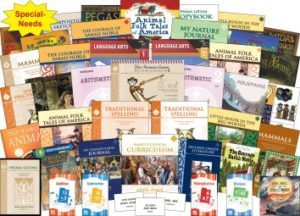
NEW! Simply Classical Curriculum Level 4
Simply Classical Journal — free magazine — stay informed on the latest releases.Cheryl Swope's Blog
- Cheryl Swope's profile
- 8 followers





